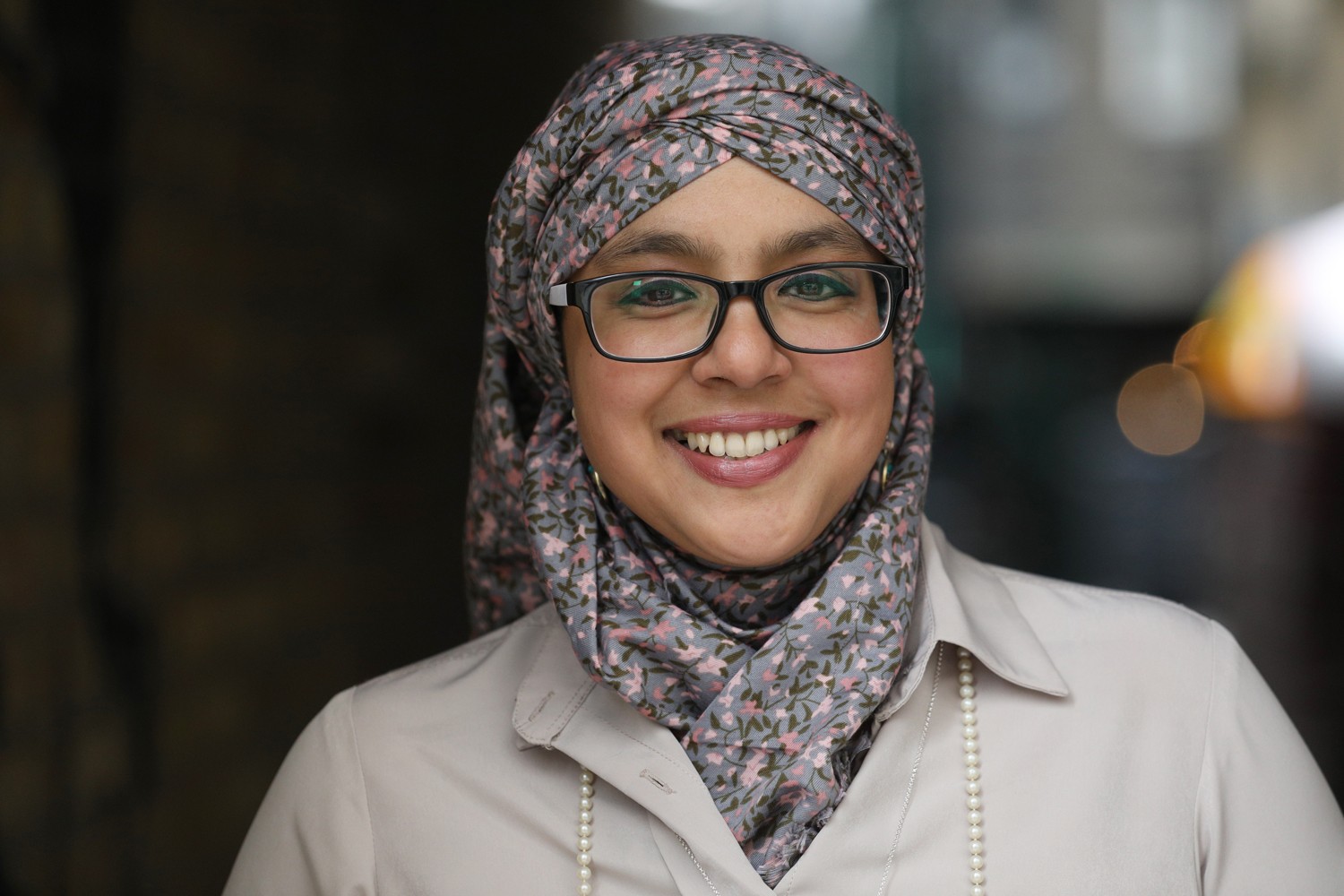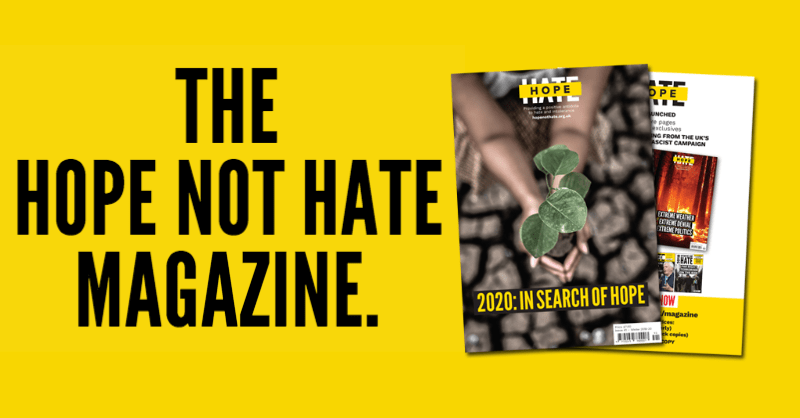HOPE not hate uses cookies to collect information and give you a more personalised experience on our site. You can find more information in our privacy policy. To agree to this, please click accept.
“Harry Potter is absolutely a refugee,” insists Onjali Raúf, when I manage to catch the best-selling children’s author and campaigner for a chat, in between…

“Harry Potter is absolutely a refugee,” insists Onjali Raúf, when I manage to catch the best-selling children’s author and campaigner for a chat, in between two other engagements on an otherwise busy afternoon.
“A refugee is someone who has been forced to move or flee for their lives and Harry Potter has been forced to do that since the day of his birth, he’s forced to live with his aunt and uncle who hate him, and in the last couple of books is literally making himself invisible – he is a refugee in every aspect of the word.”
We’re sitting in a small café near Hyde Park, London, bonding over our love of éclairs and literature while she describes her two-award winning books, The Boy at the Back of the Class published in 2018 and last year’s The Star Outside My Window. Onjali cites Superman, the children in The Lion, the Witch and the Wardrobe and Prince Philip, the Duke of Edinburgh, to emphasise her point about refugees.
The Boy at the Back of the Class, her first book, is about a refugee boy called Ahmed from Syria who joins a classroom in the UK, with the narrator being another student who desperately wants to be his friend. The book won both the Blue Peter Book Award and the Waterstones Children’s Book Prize. Onjali wrote it in the space of three months, while recovering from surgery. She says when she goes to classrooms, she tries to challenge assumptions that refugees have to be a certain colour or from a certain background.

The death of Kurdish child Alan Kurdi, who drowned during a fatal crossing from Turkey into Europe in 2015, was her awakening to the refugee crisis.
“I realised this horrific situation and the way the government was treating refugees was not going to improve,” she says.
But The Boy at the Back of the Class book was specifically dedicated to Raehan, “the baby of Calais”. For the past four-and-a-half years, Onjali had been travelling to the refugee camps in Calais and Dunkirk and was inspired by the resilience of the children she saw there in the camps.
She met a then-pregnant mother from Syria, Zainab, and rushed to raise funds in the UK so that she could help her give birth in a proper medical facility – only for Raehan to arrive early. Onjali never saw either of them again after the birth, as the camp was demolished and the refugees scattered. Some of the proceeds from The Boy at the Back of the Class went towards creating a stable home for at-risk refugees, offering therapy but also serving as a base while people were being processed.
Onjali’s second book, The Star Outside my Window, explores themes of domestic violence and abuse. “I’m very lucky that I have a publisher who is not afraid to let me tackle these issues,” she says.
She describes domestic violence and abuse as a form of hatred against another human being and insists these issues needs to be tackled in schools. “All the schools I’ve visited have just brought home how hungry children are to learn, and if you look back through the history of literature, you realise none of these topics are new.”
She recommends several books that deal with similar topics, from No Ballet Shoes In Syria by Catherine Bruton, to a graphic novel titled Illegal by Eoin Colfer and Andrew Donkin, and Refugee Boy by Benjamin Zephaniah. She says she was surprised by how hard it was to find books dealing with the issue of domestic violence, but praises The Lightjar by Lisa Thompson.
As for her newest book, The Star Outside my Window seems as much a byproduct of her campaigning as her first one. Onjali created a movement she still leads, Making Her Story, following a family tragedy – a distant cousin who rang out of the blue in 2004 after fleeing with her two young daughters from an abusive marriage. Onjali’s family spent five years supporting this woman, Mumtahina Jannat, before she was murdered by her ex-husband after the court services told her she had nothing to fear.
“Everyone let her down and setting up Making Her Story was a way to deal with the grief.”
What was so infuriating, she says, was that none of the agencies that “were supposed to help her were working together, they were all sitting on the information like gold”. The premise of Making Her Story was simply to set up a book club and raise money for women’s shelters, as funding was cut by more than two-thirds over the last eight years. However word of its services quickly snowballed, with women coming for all sorts of help.
“We became a sort of signpost,” she explains, describing the types of women who approached for help, often fleeing rape, domestic abuse or also sexual trafficking. “We started learning about trafficking and how it’s related to domestic abuse, to servitude within homes, and forced marriages – nobody thinks of this because it is just [seen as] a ‘cultural thing’.” The charity also focuses on including men – “this is everybody’s movement” – to ensure the right conversations are spread as widely as possible.
Onjali is now planning two more books, with the next one centering on homelessness and bullying.

She does admit to some pushback, mostly on Twitter, about “violating a child’s world” and that heavy themes are not issues that should be discussed with children. But the writer and activist disagrees, arguing that dealing with these subjects until after they finish primary school is leaving things too late.
Onjali argues this is why she donated to HOPE not hate’s education work, through our HOPE Education Fund. “When I heard about it, I was like this is really cool and needed,” she adds. [The HOPE Education Fund supports an education team that gives free workshops to students to better comprehend the effects of hate and discrimination.]
“Just today I had two girls come up to me and one – she was only seven or eight – told me her parents were Iraqi and had fled as refugees and that her mother had died of cancer a year-and-a-half ago. The other told me her father was a refugee from Hungary but never spoke about it.
“It’s not innocence to protect them from the truth and this isn’t a truth that will violate them, it’s a truth that will help them understand the world. Kids are not afraid of it.”
Onjali also points to teachers not receiving the support they need and being worried about tackling such subjects. “That’s another thing we don’t deal with yet, and I meet so many grateful teachers that say they were grateful I came as they did not know how to tackle these issues – so any kind of movement has to make sure teachers have the help they need.
She points to her own teachers as role models (aside from her mother, who she describes as “amazing and infuriating”), from her primary school teacher who believed and encouraged her to go to Oxford University, to the secondary school teachers who pushed her forward. “They were amazing people who didn’t see my colour, they saw someone who was passionate about books and reading – even if they didn’t look like me very often.”
The last comment is added with a wry smile, her tone alone describing the multitude of stories stemming from her identity as a brown, Muslim woman in the public space. Onjali describes her student days and how, when doing her Masters in Women’s Studies, she would wonder where “the Muslim woman voice or the Asian version of Virginia Woolf was hiding”.
“You go to job interviews in a white world, you submit books in a white world and I’ve had so many reasons to just sit and cry,” she says.
She describes the countless job applications where “everything would be fine in the phone interview until you entered the room and their faces would drop,” or getting asked “the most racist questions”. One interviewer in fact asked her if her parents would allow her to attend office parties. “And this was for someone lucky enough to go to university, lucky enough to be born here – and yet, I was still treated as a sad locked up little girl.”
Onjali also describes the perpetual battle within her own faith community and her angry moments driving her to change the status quo. The “feminist thing”, as Onjali calls it, dawned early, when she would get very angry as a seven-year-old kid that her brother did not have to help her set the table or help in the kitchen when guests were over.
“I would get really infuriated and one day one of my aunts told me to ‘stop being such a feminist’ and she said it like it was swear word.” Once she had asked her mother what the word meant, Onjali announced herself a feminist.
When I ask her about how to combat the feeling of helplessness that can develop when facing such big problems, like homelessness or refugees, she smiles. “We live in a world that is designed to make us feel helpless, from Facebook to Twitter feed, where each problem feels so massive and that we’re too small to handle it.”
But in the end there is always hope. As we finish our interview, she describes how it took her years of trying to even build up the courage to ask a homeless person how they felt.
“You feel stupid, you don’t have hundreds of pounds to give, but never underestimate the amazing ripple effect that can happen as a result of giving that pound or that smile.”
Onjali Raúf is a patron of our HOPE Education Fund. She is founder and CEO of Making Her Story.
Safya Khan-Ruf is a journalist for HOPE not hate and edits LAMP, a fortnightly newsletter examining anti-Muslim hate and prejudice.
